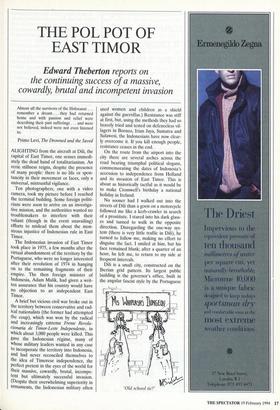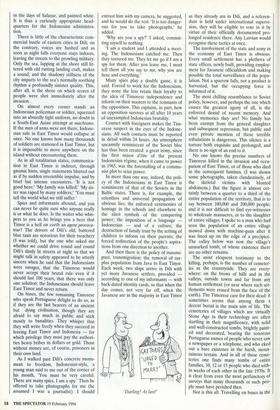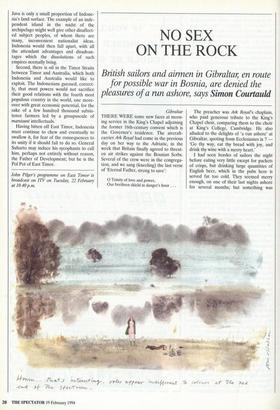THE POL POT OF EAST TIMOR
Edward Theberton reports on
the continuing success of a massive, cowardly, brutal and incompetent invasion
Almost all the survivors of the Holocaust ... remember a dream ... they had returned home and with passion and relief were describing their past sufferings ... and were not believed, indeed were not even listened to.
Primo Levi, The Drowned and the Saved ALIGHTING from the aircraft at Dili, the capital of East Timor, one senses immedi- ately the dead hand of totalitarianism. An eerie stillness reigns, despite the presence of many people: there is no life or spon- taneity in their movement or faces, only a universal, mistrustful vigilance.
Ten photographers, one with a video camera, took my picture before I reached the terminal building. Some foreign politi- cians were soon to arrive on an investiga- tive mission, and the authorities wanted no troublemakers to interfere with their valiant (though in the event unavailing) efforts to mislead them about the mon- strous injustice of Indonesian rule in East Timor.
The Indonesian invasion of East Timor took place in 1975, a few months after the virtual abandonment of the territory by the Portuguese, who were no longer interested after their revolution of 1974 in hanging on to the remaining fragments of their empire. The then foreign minister of Indonesia, Adam Malik, had given a writ- ten assurance that his country would have no objection to an independent East Timor.
A brief but vicious civil war broke out in the territory between conservative and rad- ical nationalists (the former had attempted the coup), which was won by the radical and increasingly extreme Frente Revolu- cionaria de Timor-Leste Independence, in which.about 3,000 people were killed. This gave the Indonesian regime, many of whose military leaders wanted in any case to incorporate the territory into Indonesia, and had never reconciled themselves to the idea of Timorese independence, the perfect pretext in the eyes of the world for their massive, cowardly, brutal, incompe- tent but ultimately successful invasion. (Despite their overwhelming superiority in armaments, the Indonesian military often used women and children as a shield against the guerrillas.) Resistance was stiff at first, but, using the methods they had so bravely tried and tested on defenceless vil- lagers in Borneo, Irian Jaya, Sumatra and Sulawesi, the Indonesians have now clear- ly overcome it. If you kill enough people, resistance ceases in the end.
On the route from the airport into the city there are several arches across the road bearing triumphal political slogans, commemorating the dates of Indonesia's accession to independence from Holland and its invasion of East Timor. This is about as historically tactful as it would be to make Cromwell's birthday a national holiday in Ireland.
No sooner had I walked out into the streets of Dili than a goon on a motorcycle followed me like a kerb-crawler in search of a prostitute. I stared into his dark glass- es and turned to walk in the opposite direction. Disregarding the one-way sys- tem (there is very little traffic in Dili), he turned to follow me, making no effort to disguise the fact. I smiled at him, but his face remained blank; after a quarter of an hour, he left me, to return to my side at frequent intervals.
Dili is a small city, constructed on the Iberian grid pattern. Its largest public building is the governor's office, built in the angular fascist style by the Portuguese in the days of Salazar, and painted white. It is thus a curiously appropriate head- quarters for the Indonesian administra- tion.
There is little of the characteristic com- mercial bustle of eastern cities in Dili; on the contrary, voices are hushed and as soon as night falls everyone stays indoors, leaving the streets to the prowling military.
Only the sea, lapping at the shore still lit- tered with old rusting landing craft, makes a sound; and the shadowy stillness of the city imparts to the sea's normally soothing rhythm a profoundly sinister quality. This, after all, is the shore on which scores of people were shot immediately after the invasion.
On almost every corner stands an Indonesian policeman or soldier, squeezed into an absurdly tight uniform, no doubt in
a South-East Asian attempt at machismo. If the men of arms were not there, Indone-
sian rule in East Timor would collapse at once. No one knows how many thousands of soldiers are stationed in East Timor, but it is impossible to move anywhere on the island without encountering them.
As in all totalitarian states, communica- tion in East Timor is indirect, through gnomic hints, single statements blurted out as if by sudden irresistible impulse, and by brief but intense encounters. 'It is not good here;' My family was killed;' My sis- ter was raped by many soldiers;' You must tell the world what we still suffer.'
Spies and informants abound, and you can never be quite sure who anyone really is or what he does. Is the waiter who whis-
pers to you as he brings you a beer that Timor is a hell on earth an agent provoca- teur? The drivers of Dili's old, battered
blue taxis are notorious for their treachery (I was told), but the one who asked me whether we could drive round and round Dili's dimly lit streets at night so that we might talk in safety appeared to be utterly sincere when he said that the Indonesians were savages, that the Timorese would never accept their brutal rule even if it should last 100 years, that there was only one solution: the Indonesians should leave East Timor and never return.
On buses, the few remaining Timorese who speak Portuguese delight to do so, as if they are the last bearers of an ancient but dying civilisation, though they are afraid to say much in public and stick mostly to banalities. They whisper that they will write freely when they succeed in leaving East Timor and Indonesia — for which privilege they must pay the authori- ties heavy bribes in dollars or gold. Those without money are, of course, prisoners in their own land.
As I walked past Dili's concrete monu- ment to freedom, Indonesian-style, a young man said to me out of the corner of his mouth, 'You must be very careful. There are many spies. I am a spy.' Then he offered to take photographs for me (he assumed I was a journalist). I should entrust him with my camera, he suggested, and he would do the rest. 'It is too danger- ous for you to take photographs,' he added.
`Why are you a spy?' I asked, commit- ting myself to nothing.
'I am a student and I attended a meet- ing. The Indonesians catched me. Then they tortured me. They let me go if I am a spy for them. After you leave me, I must tell them all you say to me, why you are here and everything.'
Many spies play a double game, it is said. Forced to work for the Indonesians, they none the less retain their loyalty to the idea of Timorese independence and inform on their masters to the remnants of the opposition. This explains, in part, how an opposition survives at all after 18 years of unexampled Indonesian brutality.
Contact with foreigners makes the Tim- orese suspect in the eyes of the Indone- sians. All such contacts must be reported in detail within 24 hours. An atmosphere uncannily reminiscent of the Soviet bloc
has thus been created: a great irony, since the first raison d'etre of the present Indonesian regime, when it came to power in 1965, was the forestalling of a commu- nist plot to seize power.
In more than one way, indeed, the poli- cy of the Indonesians in East Timor is reminiscent of that of the Soviets in the Baltic states. There is, for example, the relentless and universal propagation of obvious lies; the enforced ceremonies of homage in the schools and elsewhere to the alien symbols of the conquering power; the imposition of a language -
Indonesian — and of a culture; the destruction of family trust by the setting of
children to inform on their parents; the forced redirection of the people's aspira- tions from one direction to another.
And then there is the policy of transmi- grasi, transmigration: the removal of sur-
plus population from Java to East Timor.
Each week, two ships arrive in Dili with yet more Javanese settlers, provided according to one of my informants — with back-dated identity cards, so that when the day comes, not very far off, when the Javanese are in the majority in East Timor 'Darling! At last!' as they already are in Dili, and a referen- dum is held under international supervi- sion, they will be eligible to vote in it by virtue of their officially documented pro- longed residence there. Any Latvian would recognise these tactics at once.
The involvement of the state and army in the economy of East Timor is obvious. Every small settlement has a plethora of state offices, newly built, providing employ- ment for Javanese officialdom and making possible the total surveillance of the popu- lation. Not a sparrow falls, not a product is harvested, but the occupying force is informed of it.
The most chilling resemblance to Soviet policy, however, and perhaps the one which causes the greatest agony of all, is the enforced denial of recent memory. And what memories they are! No family has been exempt from the general slaughter and subsequent repression, but public and even private mention of these terrible tribulations is dangerous. This silence is a torture both exquisite and prolonged; and there is no sign of an end to it.
No one knows the precise numbers of Timorese killed in the invasion and occu- pation of East Timor, or of those who died in the consequent famines. (I was shown some photographs, taken clandestinely, of the skeletal victims with bloated abdomens.) But the figure is almost cer- tainly between a quarter to a third of the entire population of the territory, that is to say between 100,000 and 200,000 people; and it is not difficult to find eye-witnesses to wholesale massacres, or to the slaughter of entire villages. I spoke to a man who had seen the population of an entire village mowed down with machine-guns after it was lined up on the edge of a precipice. The valley below was now the village's unmarked tomb, of whose existence there are no other remains.
The most eloquent testimony to the killing, perhaps, is the number of cemeter- ies in the countryside. They are every- where: on the brows of hills and in the valleys, outside towns and far from any human settlement (or near where such set- tlements were erased from the face of the earth). The Timorese care for their dead: it sometimes seems that among them a decent burial is the main aim of life. The cemeteries of villages which are virtually Stone Age in their technology are often startling in their magnificence, with solid and well-constructed tombs, brightly paint- ed and decorated, bearing the sonorous Portuguese names of people who never saw a newspaper or a telephone, and who eked out a bare existence in the harsh, moun- tainous terrain. And in all of these ceme- teries one finds many tombs of entire families, 10, 12 or 15 people who died with- in weeks of each other in the late 1970s. It is clear from even the most perfunctory of surveys that many thousands of such peo- ple must have perished then. Nor is this all. Travelling on buses in the countryside, people will furtively point out the location of mass graves, unmarked but certainly not forgotten. One informant described to me the smell of rotting, unburied flesh after a routine massacre, a smell that lingered until the Indonesians bulldozed the corpses into a mass grave and concreted it over to make a site for a new health post, a symbol of the progress the Indonesian invasion had brought.
The mass killing is over, at least for the time being; the Indonesians now confine themselves to the usual repression, torture and disappearances. When foreign delega- tions arrive in Dili, potential troublemak- ers and unreliable elements are removed from the city until the delegations have left. Many of the Timorese who were edu- cated under the Portuguese have to report several times a week to the police. When I stayed in a remote village, the police appeared nine times in three days to enquire what I was doing there. They seemed scarcely less afraid of me than the villagers obviously were of them.
Fear, greed and ambition maintain the Indonesian occupation. So long as it con- tinues, past misdeeds can be ascribed to some higher purpose, an Indonesian mis- sion civilisatrice. But should the occupation once end, the mass murder, the brutality and the torture will then stand revealed in all their unequivocal iniquity. Thus the occupation has the logic of Macbeth: it is so steeped in blood that to return were as tedious as to go o'er. And thus the Indone- sian officers who gather in the New Ressende Inn at night to sing sentimental songs to the accompaniment of a huge karaoke television (one of them, drunk, sent over to me to ask what song I wanted him to sing in my honour) mistake their ruthlessness and brutality for patriotic firmness of purpose.
Of course, the officers profit from the occupation, both financially and from the point of view of their careers. Though there is now very little armed resistance, they can still win their spurs in East Timor. And they have muscled in on the economy, controlling absolutely the export trade, mainly coffee and sandalwood. Even the sergeants make something from the road- blocks they set up at frequent intervals.
For the Timorese, historiography is sim- ple: there are but two eras, known respec- tively at the Good Times and the Bad Times. The invasion divided them: Adam himself, referring to the Fall, would scarce- ly divide history more categorically.
But why should the Indonesians, short of neither land nor population, have been so concerned to 'return' (as they counter-his- torically refer to their own behaviour) East Timor to Indonesia?
First, Indonesia is much more of a mere- ly geographical expression than Metter- nich's Italy ever was. It is, in fact, the Javanese empire, perhaps the last great empire in the world. The Javanese are 60 per cent of Indonesia's population, but Java is only a small proportion of Indone- sia's land surface. The example of an inde- pendent island in the midst of the archipelago might well give other disaffect- ed subject peoples, of whom there are many, inconvenient nationalist ideas. Indonesia would then fall apart, with all the attendant advantages and disadvan- tages which the dissolutions of such empires normally bring.
Second, there is oil in the Timor Straits between Timor and Australia, which both Indonesia and Australia would like to exploit. The Indonesians guessed, correct- ly, that most powers would not sacrifice their good relations with the fourth most populous country in the world, one more- over with great economic potential, for the sake of a few hundred thousand subsis- tence farmers led by a groupuscule of marxisant intellectuals.
Having bitten off East Timor, Indonesia must continue to chew and eventually to swallow it, for fear of the consequences to its unity if it should fail to do so. General Suharto may induce his sycophants to call him, perhaps not entirely without reason, the Father of Development; but he is the Pol Pot of East Timor.
John Pilger's programme on East Timor is broadcast on ITV on Tuesday, 22 February at 10.40 p.m.





















































 Previous page
Previous page